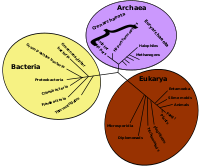Portal:Evolutionary biology/Intro

|
Evolutionary biology is the subfield of biology that studies the evolutionary processes (natural selection, common descent, speciation) that produced the diversity of life on Earth. It is also defined as the study of the history of life forms on Earth. Evolution holds that all species are related and gradually change over generations. In a population, the genetic variations affect the phenotypes (physical characteristics) of an organism. These changes in the phenotypes will be an advantage to some organisms, which will then be passed on to their offspring. Some examples of evolution in species over many generations are the peppered moth and flightless birds. In the 1930s, the discipline of evolutionary biology emerged through what Julian Huxley called the modern synthesis of understanding, from previously unrelated fields of biological research, such as genetics and ecology, systematics, and paleontology. The investigational range of current research has widened to encompass the genetic architecture of adaptation, molecular evolution, and the different forces that contribute to evolution, such as sexual selection, genetic drift, and biogeography. Moreover, the newer field of evolutionary developmental biology ("evo-devo") investigates how embryogenesis is controlled, thus yielding a wider synthesis that integrates developmental biology with the fields of study covered by the earlier evolutionary synthesis. (Full article...) |
